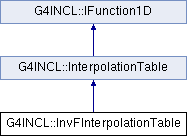Class for interpolating the inverse of a 1-dimensional function. More...
#include <G4INCLInvFInterpolationTable.hh>

Public Types | |
| typedef G4double(*const | ManipulatorFunc) (const G4double) |
| Typedef to simplify the syntax of inverseCDFTable. More... | |
Public Member Functions | |
| std::vector< G4double > | getNodeAbscissae () const |
| std::vector< G4double > | getNodeValues () const |
| unsigned int | getNumberOfNodes () const |
| virtual G4double | getXMaximum () const |
| Return the maximum allowed value of the independent variable. More... | |
| virtual G4double | getXMinimum () const |
| Return the minimum allowed value of the independent variable. More... | |
| virtual G4double | integrate (const G4double x0, const G4double x1, const G4double step=-1.) const |
| Integrate the function between two values. More... | |
| InterpolationTable * | inverseCDFTable (ManipulatorFunc fWrap=0, const G4int nNodes=60) const |
| Return a pointer to the inverse of the CDF of this function. More... | |
| InvFInterpolationTable (IFunction1D const &f, const unsigned int nNodes=30) | |
| G4double | operator() (const G4double x) const |
| Compute the value of the function. More... | |
| IFunction1D * | primitive () const |
| Return a pointer to the (numerical) primitive to this function. More... | |
| std::string | print () const |
| virtual | ~InvFInterpolationTable () |
Protected Member Functions | |
| void | initDerivatives () |
| Initialise the values of the node derivatives. More... | |
Protected Attributes | |
| std::vector< InterpolationNode > | nodes |
| Interpolating nodes. More... | |
| G4double | xMax |
| Maximum value of the independent variable. More... | |
| G4double | xMin |
| Minimum value of the independent variable. More... | |
Static Private Attributes | |
| static const G4double | integrationCoefficients [] |
| Coefficients for numerical integration. More... | |
Detailed Description
Class for interpolating the inverse of a 1-dimensional function.
Definition at line 56 of file G4INCLInvFInterpolationTable.hh.
Member Typedef Documentation
◆ ManipulatorFunc
Typedef to simplify the syntax of inverseCDFTable.
Definition at line 93 of file G4INCLIFunction1D.hh.
Constructor & Destructor Documentation
◆ InvFInterpolationTable()
| G4INCL::InvFInterpolationTable::InvFInterpolationTable | ( | IFunction1D const & | f, |
| const unsigned int | nNodes = 30 |
||
| ) |
Definition at line 52 of file G4INCLInvFInterpolationTable.cc.
References G4INCL::IFunction1D::getXMaximum(), G4INCL::IFunction1D::getXMinimum(), G4INCL::InterpolationTable::initDerivatives(), and G4INCL::InterpolationTable::nodes.
◆ ~InvFInterpolationTable()
|
inlinevirtual |
Definition at line 59 of file G4INCLInvFInterpolationTable.hh.
Member Function Documentation
◆ getNodeAbscissae()
|
inherited |
Definition at line 67 of file G4INCLInterpolationTable.cc.
References G4INCL::InterpolationNode::getX(), G4INCL::InterpolationTable::nodes, and G4coutFormatters::anonymous_namespace{G4coutFormatters.cc}::transform().
◆ getNodeValues()
|
inherited |
Definition at line 74 of file G4INCLInterpolationTable.cc.
References G4INCL::InterpolationNode::getY(), G4INCL::InterpolationTable::nodes, and G4coutFormatters::anonymous_namespace{G4coutFormatters.cc}::transform().
◆ getNumberOfNodes()
|
inlineinherited |
Definition at line 111 of file G4INCLInterpolationTable.hh.
References G4INCL::InterpolationTable::nodes.
◆ getXMaximum()
|
inlinevirtualinherited |
Return the maximum allowed value of the independent variable.
Definition at line 75 of file G4INCLIFunction1D.hh.
References G4INCL::IFunction1D::xMax.
Referenced by G4INCL::IFunction1D::inverseCDFTable(), InvFInterpolationTable(), and G4INCL::IFunction1D::primitive().
◆ getXMinimum()
|
inlinevirtualinherited |
Return the minimum allowed value of the independent variable.
Definition at line 72 of file G4INCLIFunction1D.hh.
References G4INCL::IFunction1D::xMin.
Referenced by G4INCL::IFunction1D::inverseCDFTable(), InvFInterpolationTable(), and G4INCL::IFunction1D::primitive().
◆ initDerivatives()
|
protectedinherited |
Initialise the values of the node derivatives.
Definition at line 81 of file G4INCLInterpolationTable.cc.
References G4INCL::InterpolationTable::nodes.
Referenced by G4INCL::InterpolationTable::InterpolationTable(), and InvFInterpolationTable().
◆ integrate()
|
virtualinherited |
Integrate the function between two values.
- Parameters
-
x0 lower integration bound x1 upper integration bound step largest integration step size; if <0, 45 steps will be used
- Returns

Definition at line 66 of file G4INCLIFunction1D.cc.
References G4INCL::IFunction1D::integrationCoefficients, G4INCL::Math::max(), G4INCL::Math::min(), G4INCL::IFunction1D::operator()(), G4INCL::Math::sign(), G4INCL::IFunction1D::xMax, and G4INCL::IFunction1D::xMin.
◆ inverseCDFTable()
|
inherited |
Return a pointer to the inverse of the CDF of this function.
The function parameter fWrap is wrapped around the return value of operator(). If fWrap=NULL (default), fWrap=identity.
Definition at line 123 of file G4INCLIFunction1D.cc.
References G4INCL::IFunction1D::getXMaximum(), G4INCL::IFunction1D::getXMinimum(), G4INCL::IFunction1D::IFunction1D(), G4INCL::Math::min(), G4INCL::IFunction1D::operator()(), G4INCL::IFunction1D::xMax, and G4INCL::IFunction1D::xMin.
Referenced by G4INCL::NuclearDensityFactory::createPCDFTable(), G4INCL::NuclearDensityFactory::createRCDFTable(), and G4INCL::NuclearDensityFactory::createRPCorrelationTable().
◆ operator()()
Compute the value of the function.
Implements G4INCL::IFunction1D.
Definition at line 91 of file G4INCLInterpolationTable.cc.
References G4INCL::InterpolationTable::nodes.
◆ primitive()
|
inherited |
Return a pointer to the (numerical) primitive to this function.
Definition at line 105 of file G4INCLIFunction1D.cc.
References G4INCL::IFunction1D::getXMaximum(), G4INCL::IFunction1D::getXMinimum(), G4INCL::IFunction1D::IFunction1D(), G4INCL::IFunction1D::operator()(), Primitive, and G4INCL::IFunction1D::xMin.
◆ print()
|
inherited |
Definition at line 108 of file G4INCLInterpolationTable.cc.
References CLHEP::detail::n, and G4INCL::InterpolationTable::nodes.
Referenced by G4INCL::NuclearDensityFactory::createPCDFTable(), G4INCL::NuclearDensityFactory::createRCDFTable(), and G4INCL::NuclearDensityFactory::createRPCorrelationTable().
Field Documentation
◆ integrationCoefficients
|
staticprivateinherited |
Coefficients for numerical integration.
Definition at line 110 of file G4INCLIFunction1D.hh.
Referenced by G4INCL::IFunction1D::integrate().
◆ nodes
|
protectedinherited |
Interpolating nodes.
Definition at line 128 of file G4INCLInterpolationTable.hh.
Referenced by G4INCL::InterpolationTable::getNodeAbscissae(), G4INCL::InterpolationTable::getNodeValues(), G4INCL::InterpolationTable::getNumberOfNodes(), G4INCL::InterpolationTable::initDerivatives(), G4INCL::InterpolationTable::InterpolationTable(), InvFInterpolationTable(), G4INCL::InterpolationTable::operator()(), and G4INCL::InterpolationTable::print().
◆ xMax
|
protectedinherited |
Maximum value of the independent variable.
Definition at line 106 of file G4INCLIFunction1D.hh.
Referenced by G4INCL::IFunction1D::getXMaximum(), G4INCL::IFunction1D::integrate(), and G4INCL::IFunction1D::inverseCDFTable().
◆ xMin
|
protectedinherited |
Minimum value of the independent variable.
Definition at line 104 of file G4INCLIFunction1D.hh.
Referenced by G4INCL::IFunction1D::getXMinimum(), G4INCL::IFunction1D::integrate(), G4INCL::IFunction1D::inverseCDFTable(), and G4INCL::IFunction1D::primitive().
The documentation for this class was generated from the following files:
- source/processes/hadronic/models/inclxx/utils/include/G4INCLInvFInterpolationTable.hh
- source/processes/hadronic/models/inclxx/utils/src/G4INCLInvFInterpolationTable.cc